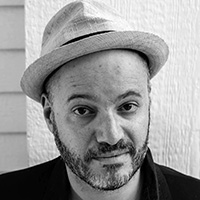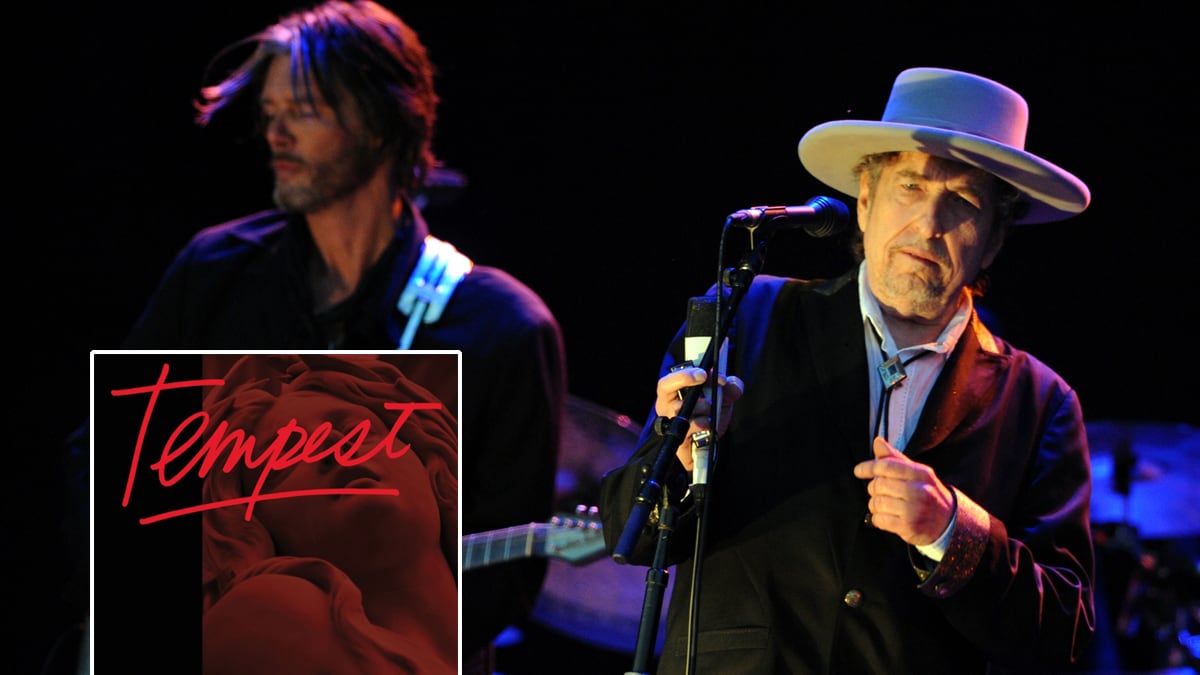“You say I'm a gambler, you say I'm a pimp/ But I ain't neither one/ Listen to that Duquesne whistle blowing/ Sounding like it's on a final run.” So wheezes Bob Dylan, 71, on "Duquesne Whistle,” the opening track to Tempest, his 35th studio album. It was 50 years ago that 21-year-old Bob Dylan talked his way into a Columbia Records contract by telling tales of a colorful youth as an orphan hopping the trains, a story that was debunked in the pages of Newsweek a year later. And yet another side of Bob Dylan takes us down another track a half-century later. He is worse for wear, and that is his point, somewhere in the limbo between gambler and pimp, with the exit sign looming ever closer.
Dylan recently told Rolling Stone that he had intended to write religious songs for this album, but the songs just didn’t end up that way, even though the Book of Revelations makes an appearance right on schedule. Chaos has come again, and Dylan seems pulled to the dark side. From listening to this album—filled with killing floors, “lyin’ and dyin in blood,” and a “flat chested junkie whore” all leading him, if not to temptation, than a tempest of the soul—it’s clear that Dylan’s done his three score years and eleven, and he’s not going quietly.
Indeed, anger is an emotion that the Dylan canon could not do without. “Masters of War,” "Only a Pawn in their Game," “It’s All Over Now, Baby Blue,” “Like a Rolling Stone,” “Idiot Wind”: all sublime exercises in venom, sneered with a compelling hostility mere mortals wish they could produce in their darkest hours. When Dylan found Jesus for three albums, then subsequently discovered his Jewishness on another, his religiosity gave him another pulpit for his rage. His targets were no longer the Military Industrial Complex, racist crackers, or a lover who’s just gone out the door, but Judas, the Devil, even Yassir Arafat. Eventually, the years piled up, and Dylan became more cryptic. He kept his second marriage and divorce a secret for years, and no one has been able to pin him down on his personal life, his politics, or his religion. All we have are the songs and the performances, which is how he wants it, and which is just as well. Something happened to that anger as the years and albums and endless dates of touring piled up. His late-career comeback Time Out of Mind (1997) makes clear that someone broke his heart, and something—his mother’s death, turning 60—made him elegiac on “Love and Theft,” an album released on Sept. 11, 2001, 11 years to the day of the release of Tempest.
In fact, another anniversary of a national calamity inspired the album’s title track and hyped centerpiece. The Titanic disaster of 1912 has now seen nearly a century of income tax returns go by. “The Titanic sails at dawn,” sang Dylan in 1965’s “Desolation Row,” but he was apparently just getting started. These days, as Dylan continues to wend his way through the world playing over 100 gigs a year, he spends more time in hotel rooms than he does on any of his properties. One night, perhaps rifling through a minibar, he stumbled upon James Cameron’s ultimate Hollywood disaster pic. Early in the film, Leonardo DiCaprio says, “When you got nothin’ you got nothin’ to lose,” a line from “Like a Rolling Stone” evoking a 1965 sentiment plausible for a roustabout of 1912. Dylan, who has, in this century, shown an almost pathological tendency for using other people’s words, must have seen DiCaprio throwing his own words at him and then thought of the Carter Family’s “The Great Titanic.” Then he thought that the world needed a song for the centenary, in which he even refers to DiCaprio, not by the name of his character—just plain Leo. “Tempest” is a doomed sea chantey, with David Hildago’s violin adding an Irish lilt, and while it runs 14 minutes, you get the idea pretty quickly. It is Dylan’s second-longest song (on Dylan’s longest album ever).

As long Dylan songs go, though, while it has some stirring images (toward the song’s end, Leo has gone mad, warring with Cleo, who is either his rhyming goddess of history or fame, both entities with which Dylan has collided), it lacks the inspired absurdity of “Desolation Row,” the surreal passion of “Sad-Eyed Lady of the Lowlands,” the narrative sweep of the 16-minute “Highlands,” or the lyrical stoicism of “Ain’t Talkin’.” Does the song justify its length? A guy who writes 45 verses is not exactly short on inspiration. Like the Carter Family tune, the song stays in a major key while the ship sinks ever deeper. Dylan has announced the end of the world almost as soon as his own got started with “A Hard Rain’s A-Gonna Fall,” and this one ends somewhere between bang and whimper.
At first, “Soon After Midnight” sounds like a smoochy jukebox ballad in the vein of “Where Teardrops Fall.” Then it gets nasty: “Charlotte’s a harlot/ Dresses in scarlet/ Mary dresses in green/ It’s soon after midnight, and I’ve got a date with the faerie queen.” It’s unclear whether Dylan has a date with Edmund Spenser’s epic poem or a celestial sprite, but Charlotte, the harlot in scarlet, has gotten a bad rap for a reason. It gets worse: “They chirp and they chatter/ What does it matter?/ They’re lyin’ and dyin’ in blood/ Two-timin’ Slim/ Who’s ever heard of him?/ I’ll drag his corpse through the mud.” If you didn’t already know this about Dylan, know it now: do not piss this guy off; he could humiliate your corpse. In the video for “Duquesne Whistle,” some poor sap, attempting to impress the wrong girl at the wrong time, gets the living crap beaten out of him; at the end, Dylan, walking briskly with a truly bizarre posse (including a trollop in a platinum wig and a guy in KISS makeup) ignores the poor guy lying down on the sidewalk, who then feels compelled to follow the entourage anyway. “Narrow Way” could have been another religious song gone evil. “Because strait is the gate, and narrow is the way, which leadeth unto life, and few there be that find it,” or so says Matthew 7. But there is nothing meek and mild about lines like these: “Your father left ya/ Your mother, too/ Even death has washed its hands of you.”
What happens if you’re too defiled for Madame Death herself? Dylan is, after all, a guy who let the HBO vampire series True Blood name two episodes after his songs, which played in their entirety on the closing credits. All over this album, Dylan splatters enough blood to make Quentin Tarantino wince. “I pay in blood, but not my own,” he growls. Call it Bob Dylan Undead. “Scarlet Town,” a dark and hypnotic ballad, depicts a red-light district of the soul, with a hushed and craggy croon. Good and evil exist side by side; guess who prevails in the end? In this moral ferment, Dylan’s radar is certainly up: “You’ve got legs that can drive men mad/ A lot of things we didn’t do that I wish we had.” Regrets, he’s had a few. Still, the penitent intervenes: “I’m stayin’ up late and I’m makin’ amends/ While the smile of heaven descends.” The smile doesn’t last long on Tempest. He ends with “Roll On John,” a dark tribute to John Lennon. He could have paid homage more than 30 years ago, so why now? Dylan, who, in 1972, wrote a supportive letter to the INS when Lennon was having immigration troubles, quotes from “A Day in the Life” and “Come Together,” but in the tradition of pastoral elegy, Dylan is really mourning himself. The verses get weirder and weirder. Lennon lines give way to William Blake and the lord’s prayer: “Tyger tyger burning bright/ I pray the lord my soul to keep/ In the fortress of the night/ Cover him over and let him sleep.” Rest, rest perturbed spirit. Dylan still walks among us, a long way from peace.
Along with Paul McCartney and a short list of others, Dylan is one of Lennon’s few surviving peers, and while the honors pile up, Tempest reminds us that, with all its macabre power, Dylan remains a mystery. Last spring, he received the Presidential Medal of Freedom. In a White House ceremony, President Obama wrapped a medal around Dylan’s neck. Dylan, wearing a tux, never took off his shades. Cameras snapped and whirred, yet he was hidden in plain sight. “No man sees my face and lives,” he once sang, appropriating Exodus and playing the badass. More recently, a young staff writer for the New Yorker was forced to quit his job when it turned out that he invented quotations for Dylan in a book chapter called “Bob Dylan’s Brain.” The guy won’t even show the whites of his eyes for the president. Did anyone really expect him to reveal his grey matter?
This album certainly shows lots of red matter, even on the cover, with Carl Kundmann’s sculpture of the Moldau’s goddess bathed in ruby red. There are many guts strewn throughout this record; with torn and frayed vocal cords, they are all too human. Dylan gives us his insides, but keeps us guessing. If you want to know what’s actually in this guy’s brain, or heart or soul, the guessing game does not stop here. On “Long and Wasted Years,” Dylan, barking and emoting, is as confessional as he gets: “I wear dark glasses to cover my eyes/ There're secrets in them I can't disguise.”






